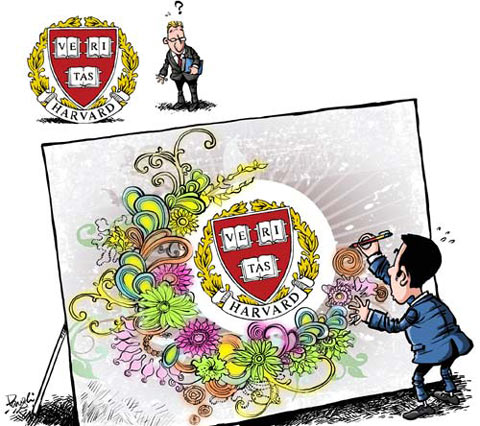當(dāng)前位置: Language Tips> 雙語新聞
The Chinese art of mythmaking
分享到

|
An outsider's perspective is valuable. But even in this age of instant information the outsider could become a poster boy made malleable by preconceived perceptions and a thirst for contrast. In the minds of most Chinese, the word "Harvard" is synonymous with educational excellence - to the point of overshadowing other equally top-notch Western institutions of higher education except maybe Oxford and Cambridge. However, the Harvard in the Chinese imagination is not the Harvard by the Charles River in Boston. It is a myth shrouded in layers of cultural misperception. When I was a kid, a friend of my father's, one of the very few who had been to other provinces of the country, described Harvard as a school with very high walls, where students were not allowed to go outside during the four years of their study, not even when their parents died. They had to memorize tons of text from early morning until late at night. Now that I recall it, the Harvard believed in by this relatively well-informed person (for that era) was a cross between an ancient Chinese school and a prison. Had he been shown the movie Love Story, which was made around the same time and was about a Harvard student, he would have been devastated: "What? A student could date and get married while in school?" Even with China's opening up and with the growing exchange of information, some Chinese people simply cannot resist the temptation of molding China's favorite foreign university in our own image, which is essentially a school staffed by thousands of tiger moms. Thus were born the rumors about the 20 statements plastered on the walls of Harvard's library. The statements were said to include: "If you sleep now, you will have a dream, but if you study now, you will realize a dream"; "Even though happiness is not based on a person's performance records, success is the likely result"; and "If you study one more hour, you will have a better husband." In 2012, The Wall Street Journal carried an article that quoted Professor Robert Darnton, who stated unequivocally: "As the university librarian, I can attest that no such writings exist on any of the walls at Harvard's 73 libraries." The professor may not know that he has many phantom colleagues who have penned Chinese best-sellers. There is a special section in China's publishing industry, usually operated underground and with retail outlets on sidewalks, that churn out many inspirational and how-to books. They tend to have extremely catchy titles, such as Executive Power, which was supposedly authored by a certain Professor Paul Thomas, who is on the Harvard Business School faculty. After selling 2 million copies, this volume of inspiration, which was said to be President Lincoln's favorite book, was found to be totally phony. There was no English original and Paul Thomas was a name the publisher created out of the blue. Harvard Mottos is another such book, but its author seems to have more flesh and blood than Paul Thomas of Executive Power. Danny Feng is reported to be a Beijinger who has studied in the United States. After the scam was exposed, Feng said he based his book on an online post by expanding on each of the 20 mottos. It was a fly-by-night operation, taking only two months from the book's conception to hitting store shelves. The trend can be traced back to 2000 when Liu Yiting, the Harvard Girl was published. Liu's mother, Liu Weihua, wrote a book chronicling her methodology of teaching her daughter that ended up with the younger Liu being admitted into Harvard's undergraduate program. The book sold a cumulative 2 million copies and spawned another book of rebuttal. In Truth, Xiao Yu wrote that the way Liu was trained, as described in her mother's book, is traditionally Chinese rather than Western. He adds: "The reason the myth has held up is the word Harvard. Most in China do not know the real Harvard and they placed a halo of admiration around it." At least Liu Yiting is a real person who really got into Harvard and her mother really wrote that book. Most of those responsible for the Harvard-related success stories may not even have a college diploma. Many of those inspirational books were hack jobs by those with marketing savvy and whose writing consists mostly of copying and pasting from online sources. My parents did not write books. But they instinctively used comparison as a means of motivating me while I was young. "That kid next door is studying from 5 am to 10 pm," or, "He's got all As, but what have you got?" It dawned on me that my next-door neighbor was actually serving as a kind of miniature Harvard in my parents' pedagogy. But as a real person he posed many inconveniences, especially when he started to flunk his courses. But Harvard is always there, so remote and so impersonal that it can be whatever you need it to be. Chinese websites are overflowing with feel-good pieces of factoids and dubious information. People who are eager to share but are totally ignorant of such concepts as "check and verify" will resend a piece they feel important, which could instantly reach millions, usually depending on how catchy the title is. By the time experts come out to clarify, the damage is done. The clarification piece would at best make a small dent in the colossal machine of myth-making. Misinformation flourishes with issues closest to the hearts of the Chinese people. Education is one. Because many in China are frustrated with the education system, stories from the US are needed as a contrast. Meanwhile, Chinese parents will use the "next-door kid" approach to justify their method of discipline. Likewise, Chinese show their displeasure at official corruption by spreading stories in which foreign bureaucrats were sacked for taking laughably small favors. Mind you, not all of these stories are fabricated a la the Harvard professors' books. Some are true stories distributed by bona fide news organizations. Others have a modicum of truth, but got embellished as they went around. However, they provide a partial picture if not a distorted one. If housing prices in China are obscenely high, those in other countries must be affordable, as attested by comparative photos with prices attached. Never mind that it's ludicrous in the first place to compare an apartment within Beijing's Third Ring Road with a house in Montana. Many people are impatient with stories with context because the subtleties and nuances confuse them, depriving them of the pleasure of drawing simple conclusions. If you say Chinese education has certain advantages that the American way does not, and vice versa, as I have sometimes done, you'll offend both the pro-Chinese-education camp and the opposing camp. Both sides will see you as an enemy. The third party as contrast is a natural development of an earlier trend, which is the third party as confirmation. We used to love this approach, citing foreigners' customary congratulations as testament of the high quality of our artistic works. Just at the turning point when many Chinese awoke to this pitfall, along came Wolfgang Kubin, a German Sinologist who categorically branded Chinese literature as "trash". He grew to be the voice for Chinese discontent with our own literary scene. I suspect that even when he stops critiquing Chinese literature people will make up quotes and attribute to him. If I come up with "20 reasons I hate Chinese literature" and put down Kubin's name, I can guarantee the piece will hit every website in China within a day. By Raymond Zhou ( China Daily ) |
旁觀者的觀點(diǎn)通常是有益的。但是在這個(gè)即時(shí)通信的時(shí)代,旁觀者很可能會成為受先入為主觀念和反差欲影響的典型例子。 在很多中國人的心里,“哈佛”就是優(yōu)秀教育的同義詞——甚至超過了除牛津和劍橋之外的同等級西方高校。 然而,中國人想象中的哈佛大學(xué)卻遠(yuǎn)遠(yuǎn)不是波士頓查爾斯河畔的哈佛大學(xué)真實(shí)的一面。中國人腦海里的哈佛,只是由于文化誤解而導(dǎo)致的錯誤的看法。當(dāng)我還是一個(gè)孩子的時(shí)候,我父親的一個(gè)朋友是當(dāng)時(shí)少有的去過其他省份的人。他描述的哈佛大學(xué)有著高高的圍墻,學(xué)生在四年學(xué)習(xí)中不允許外出,就算父母去世也不行。這些學(xué)生必須從早到晚記憶背誦著無數(shù)的東西。 現(xiàn)在,當(dāng)我回憶起這件事的時(shí)候,這位相對來說在那個(gè)年代還比較有學(xué)問的人,他腦海里的哈佛只是古代中國私塾和監(jiān)獄的融合罷了。有一部名為《愛情故事》的電影拍攝的就是那個(gè)時(shí)候的哈佛和哈佛學(xué)子。如果他看了這部電影的話,一定會大吃一驚:“什么?學(xué)生在學(xué)校可以約會,還可以結(jié)婚?” 就算中國改革開放,與外界的信息交流不斷增加,一些中國人還是抵抗不了這些一直以來都是中國人心中最好的國外大學(xué)的吸引力,認(rèn)為那里充滿了千千萬萬個(gè)虎媽。有謠言說哈佛圖書館的墻上有20條訓(xùn)言,包括“此刻打盹,你將做夢;此刻學(xué)習(xí),你將圓夢”;“幸福或許不排名次,但成功必排名次”;“多學(xué)習(xí)一個(gè)小時(shí),你會找到更好的丈夫”。 2012年,《華爾街日報(bào)》刊登了一篇文章,援引了羅伯特·達(dá)恩頓教授的一句話,他清楚明白地說:“作為一名大學(xué)圖書管理員,我敢保證,哈佛73家圖書館的墻上,都沒有這樣的訓(xùn)言。” 這位教授可能不知道,他有許多“虛幻的”同事寫的書是中國暢銷書。 中國出版業(yè)有一塊特殊領(lǐng)域,會大量生產(chǎn)劣質(zhì)勵志和指導(dǎo)書籍,通常秘密印刷,然后在路邊攤銷售。 這些書通常都會有搏人眼球的書名,例如《執(zhí)行力》,是所謂哈佛商學(xué)院教授保羅·托馬斯寫的。在售出200萬冊后,這本據(jù)說是林肯總統(tǒng)最喜愛的勵志書被發(fā)現(xiàn)是假冒偽劣產(chǎn)品。這本書并沒有英文原版,保羅·托馬斯這個(gè)名字也是出版社憑空捏造的。《哈佛訓(xùn)言》也是如此,但是它的作者聽起來比保羅·托馬斯更有血有肉。丹尼·馮是曾經(jīng)在美國讀書的北京人。在騙局被揭穿之后,馮說他根據(jù)網(wǎng)上的20條格言,擴(kuò)展為一本書。這個(gè)不可靠的把戲,使得這本書從發(fā)行到暢銷只用了2個(gè)月的時(shí)間。 這種風(fēng)氣可以追溯到2000年《哈佛女孩劉亦婷》的出版。劉亦婷的母親劉衛(wèi)華在這本書中記錄了她對女兒的教育方法,一直記錄到劉亦婷考上哈佛的本科生。這本書累計(jì)銷量為200萬冊,還引起了另外一本書的反駁。 事實(shí)上,蕭愚在書中寫道,正如劉亦婷母親書中所寫的,她對劉亦婷的訓(xùn)練是傳統(tǒng)的中式的,而非西式的。而且,他說,“這種錯誤的觀念甚囂塵上的原因是哈佛這個(gè)詞,許多中國人并不知道真正的哈佛是怎樣的,他們在哈佛頭上強(qiáng)加了榮譽(yù)的光環(huán)。” 但是至少劉亦婷是一個(gè)真實(shí)存在的人物,并且確實(shí)進(jìn)入了哈佛,而且她母親也確實(shí)寫了那本書。 許多寫了與哈佛相關(guān)的成功學(xué)書籍的人甚至都沒有大學(xué)文憑。許多勵志書都是由那些洞察市場的人,從網(wǎng)上復(fù)制粘貼而搞出來的平庸至極的東西。 我的父母不寫書,但是在我小的時(shí)候他們會本能地用對比來激勵我。“隔壁孩子每天從早上5點(diǎn)學(xué)到晚上10點(diǎn)”,或是“人家都得了優(yōu)秀,你看你得了什么?” 我認(rèn)識到在我父母的教育法中,鄰居家孩子只是哈佛的一個(gè)縮小版。但是他作為一個(gè)真實(shí)存在的人,自己有很多麻煩,特別是不及格的時(shí)候。而哈佛永遠(yuǎn)在那里,那么遙遠(yuǎn),無情無欲的,你想讓它是什么樣子,它就可以是什么樣子。 中國網(wǎng)站上充斥著許許多多的看似真實(shí)實(shí)則虛假的消息。 那些熱衷于分享,卻又沒有查證意識的人經(jīng)常會轉(zhuǎn)發(fā)一些他們認(rèn)為重要的東西,只要有一個(gè)搏人眼球的標(biāo)題,轉(zhuǎn)發(fā)經(jīng)常會立馬達(dá)到數(shù)百萬人次。等到專家出來澄清的時(shí)候,危害已經(jīng)釀就。這些澄清最多能在龐大的造謠機(jī)器表面,造成小小的凹陷而已。 虛假信息經(jīng)常和中國人的生活密切相關(guān),教育就是其中之一。因?yàn)楹芏嘀袊藢逃贫炔粷M,這樣,關(guān)于美國的教育故事剛好可以拿來做對比。同時(shí),許多中國父母經(jīng)常會用“別人家孩子”來證明他們的教育方法。相似的,中國人經(jīng)常會對通過傳播一些國外官員因?yàn)槭杖⌒《餍』荩涣T免的故事,來表達(dá)他們對于中國官員腐敗的不滿。 提醒一下,并不是所有類似哈佛教授的書都是瞎編亂造的。一些就是由真實(shí)的新聞組織發(fā)布的真信息。還有一些只有一小部分是真實(shí)的,但是隨著廣泛的傳播,不斷地被添油加醋。然而,這至少不算完全扭曲事實(shí),只是片面的反映了現(xiàn)實(shí)。 如果在一組標(biāo)有價(jià)格的對照圖片中,中國的房價(jià)高的嚇人,而外國的房價(jià)還在人們的承受范圍之內(nèi),那么不要驚訝,這一定是在可笑地將蒙大拿的房子和北京三環(huán)的公寓所比較。 許多人都沒有耐心看帶有文字的東西,因?yàn)槟切┘?xì)微的差別會把他們搞糊涂,使得他們喪失了簡單下結(jié)論的快感。我曾經(jīng)這樣試過,如果你說中國教育有一些美國教育沒有的優(yōu)點(diǎn),反之亦然,那么你將會把中國教育的支持派和反對派都得罪,雙方都會把你當(dāng)成敵人。 從將第三方當(dāng)作證實(shí)者,到將第三方當(dāng)作對比,這是自然發(fā)展的結(jié)果。我們曾經(jīng)熱愛這種方法,將外國人的按慣例的祝賀當(dāng)作對我們高質(zhì)量藝術(shù)作品的證明。 在這個(gè)中國人意識到問題的轉(zhuǎn)折點(diǎn),沃爾夫?qū)ゎ櫛颍@位德國漢學(xué)家,認(rèn)為中國文學(xué)非常“拙劣”。他逐漸成為表達(dá)對中國文學(xué)現(xiàn)象不滿的人。 我懷疑,當(dāng)他停止批評中國文學(xué)的時(shí)候,又會出現(xiàn)很多他的名人名言。如果我想出“我討厭中國文學(xué)的20個(gè)理由”,然后標(biāo)上顧彬的名字,我敢保證,這將會在一天之內(nèi)成為各大論壇的熱點(diǎn)。 (中國日報(bào)周黎明 譯者 愛吐泡泡小螃蟹 編輯 丹妮) 掃一掃,關(guān)注微博微信
  |
上一篇 : 有其父必有其子?邁克爾·杰克遜子女生活奢侈隨父親
下一篇 : 巴西設(shè)“世界杯假日” 國民不用請假看球
分享到
關(guān)注和訂閱


關(guān)于我們 | 聯(lián)系方式 | 招聘信息
電話:8610-84883645
傳真:8610-84883500
Email: languagetips@chinadaily.com.cn